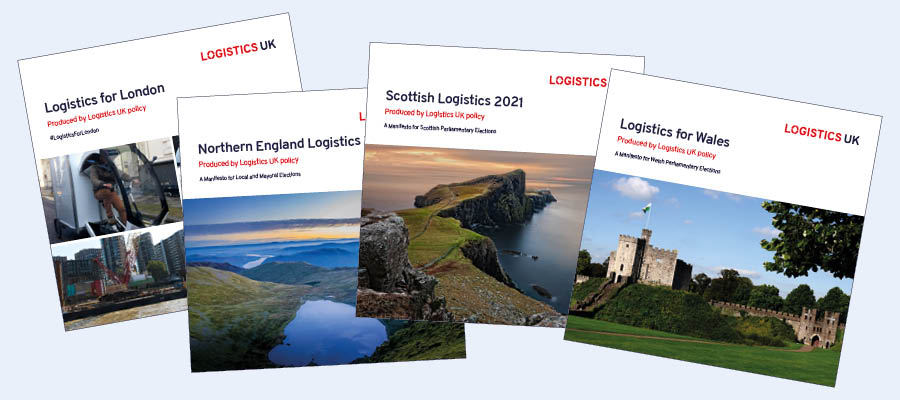🕒 Article read time: 2 minutes
Logistics UK submits key asks to regional bodies ahead of elections

Ahead of the local and mayoral elections and parliamentary elections in Scotland and Wales on 6 May 2021, Logistics UK has produced four manifestos which it has sent to key political stakeholders, including Members of Parliament and government officials.
The documents outline the main areas where the logistics industry can inform and support the transport goals of London, Scotland, Wales and Northern England, and include key policy asks for each administration.
ENVIRONMENT
Wales: Logistics UK has made four key asks to support the Senedd’s objective to improve Wales’ air quality and reduce greenhouse emissions. These range from avoiding HGV restrictions that force businesses to replace a single vehicle with several smaller ones, resulting in increased traffic, to allowing lorries access to underutilised bus lanes to reduce congestion and lower emissions.
Scotland: Logistics UK's main asks for the environment in Scotland range from the need to support Scottish Government in trialling alternatively-fuelled transport solutions to calling for both the UK and Scottish governments to bring forward the market in cleaner, low-carbon HGVs.
London: improving air quality and reducing greenhouse emissions is one of the capital’s highest priorities. Logistics UK’s environmental asks include a radical reform of the London Lorry Control Scheme and safeguarding wharves to promote the use of water freight in construction projects.
Northern England: Logistics UK’s five asks for the environment in Northern England range from a policy framework for alternative fuels to urging government to recognise the value of measures to improve efficiencies in the existing fleet.
ECONOMY
London: the capital’s economy depends on efficient logistics to service its shops, offices, hospitals, schools and night-time economy. Logistics UK’s economic asks of the capital range from appointing a Freight Commissioner for London to delivering the Silvertown Tunnel by 2025.
Northern England: goods and services need to be able to continue to move freely around the cities, towns and villages of the north of England to help the region recover from the economic impacts of the pandemic. The main ask here is to ensure that logistics operators are not unfairly penalised when the government or local authorities legislate for strategic changes in local towns or cities.
Scotland: in common with Northern England, Logistics UK’s principal ask for the Scottish economy is to ensure logistics businesses are not unfairly penalised when Scottish Government or local authorities legislate for changes in the country, whether they operate in the cities of the Central Belt or the rural Highland and island communities,
TRANSPORT STRATEGY FOR WALES
Wales: published in late 2020, the Welsh Government’s draft Transport Strategy sets out its ambitions to shape the future of transport for the next 20 years. Logistics UK’s primary asks for the Transport Strategy include developing the proposed Logistics and Freight Plan for Wales hand-in-hand with industry and other UK governments, and fully integrating freight and logistics into the Planning Rules for Wales to ensure the needs of the sector are provided for.
CONNECTIVITY
Scotland: Logistics UK’s prime ask for connectivity is to secure future investment in Scotland’s infrastructure to ensure it remains economically competitive and not disadvantaged by its geography.
Northern England: Logistics UK has two significant asks for connectivity in the region. The first is for network resilience to ensure reliable and safe routes to both export and import the goods that are vital to the area’s economy. The second is for modal shift to maximise the use of rail for freight traffic and fully utilise other air and sea modes where viable.
SAFETY
London: improving the safety of vulnerable road users on the roads of the capital has long been a priority for the logistics sector. Logistics UK has three main asks on this issue. The first is to dramatically reform the London Lorry Control Scheme to enable deliveries to be made outside of peak hours. The second is to deliver infrastructure that protects vulnerable people whilst retaining capacity on major routes, as well as access to kerbsides and residential streets for deliveries. The final ask is to increase enforcement against serially non-compliant HGV operators in London.
MULTIMODAL
Scotland: Logistics UK’s key ask for multimodal logistics in Scotland is to secure capacity and maximise the use of rail for freight traffic where appropriate, as well as fully utilise other air and sea modes where practicable and financially viable; this will support the Scottish Government’s vision for carbon reduction in transport.
SKILLS AND EMPLOYMENT
Scotland and Northern England: Alongside its request to government to secure funding resources and training avenues for logistics businesses to utilise Apprenticeship Levy commitments, Logistics UK is asking the Scottish and UK governments to provide access to funding to help businesses, and quickly retrain those who have been made redundant during the current economic crisis and restart their career in logistics.
“Logistics UK’s suite of manifestos is designed to raise awareness about the vital importance of freight to the economies of the devolved administrations, capital and key regions of the UK,” said Mags Simpson, Head of Policy Engagement, Logistics UK, “By campaigning on the issues specific to each area, as well as those common to all, Logistics UK can increase the impact of its policy activities, to the benefit of the UK logistics sector as a whole.”
*www.logistics.org.uk/campaigns
Published On: 15/04/2021 17:00:02

Comments Section
If you are a Logistics UK member login to add comments.